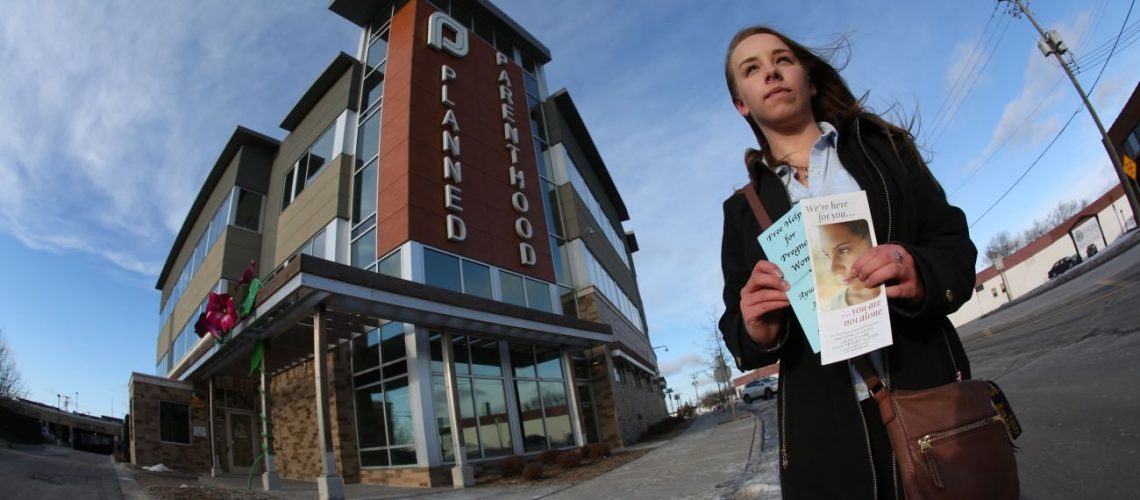Much attention has been devoted to the Freedom of Access to Clinic Entrances Act (FACE) since its enactment on May 26, 1994. This provision of the United States Code is being used to squelch legitimate political protest activity. The United States Government considers this type of speech dangerous, and worthy of criminal prosecution. We think the squelching of legitimate protest speech is the dangerous activity.
Here at the National Legal Foundation, we believe FACE is both unnecessary and unconstitutional. It is unnecessary because violence and intimidation is already illegal in this country. It is illegal to deface or destroy property–any property, “reproductive health facility” or not. It is illegal to threaten, intimidate, or injure people–any person, whether they are seeking an abortion or not. FACE does not address a previously “undiscovered” or unpunished realm of criminal activity. Everything identified as illegal in this statute was illegal before the statute ever became law.
If these activities are already criminal then what possible affect will FACE have on the legal landscape? FACE does nothing more than allow the unconstitutional criminalization of legitimate political protest. FACE is simply another weapon designed to silence those dedicated to the protection, rather than the destruction, of life. The pro-life message is powerful. It is convicting, convincing, and compelling. Most importantly, it saves lives. So Planned Parenthood attempts to silence the protest.
Much of the FACE text is provided below. As you read through it, pay close attention to the terms used in the prohibited activities section, specifically “intimidation,” “interfere with,” “physical obstruction,” “force,” “threat of force,” and “injures.” These are the activities that have been criminalized. They are either very broadly defined or left undefined by the statute. These broad definitions have opened the door to declaring previously innocent, constitutionally protected activity illegal.
We believe this is wrong, and will make every effort to ensure that this law is not allowed to interfere with the constitutional rights and freedoms of pro-life citizens.
18 USCS § 248. Freedom of Access to Clinic Entrances
(a) Prohibited Activities. Whoever —
(1) by force or threat of force or by physical obstruction, intentionally injures intimidates of interferes with or attempts to injure, intimidate or interfere with any person because that person is or has been, or in order to intimidate such person or any other person or any class of persons from, obtaining or providing reproductive health services;
(2) by force or threat of force or by physical obstruction, intentionally injures, intimidates or interferes with or attempts to injure, intimidate or interfere with any person lawfully exercising or seeking to exercise the First Amendment right of religious freedom at a place of religious worship; or
(3) intentionally damages or destroys the property of a facility, or attempts to do so, because such facility provides reproductive health services, or intentionally damages or destroys the property of a place of religious worship, shall be subject to the penalties provided in subsection (b) and the civil remedies provided in subsection (c), except that a parent or legal guardian of a minor shall not be subject to any penalties or civil remedies under this section for such activities insofar as they are directed exclusively at that minor.
(c) Rules of Construction. Nothing in this section shall be construed —
(1) to prohibit any expressive conduct (including peaceful picketing or other peaceful demonstration) protected from legal prohibition by the First Amendment of the Constitution;
(2) to create new remedies for interference with activities protected by the free speech or free exercise clauses of the First Amendment to the Constitution, occurring outside a facility, regardless of the point of view expressed, or to limit any existing remedies for such interference;
(3) to provide exclusive criminal penalties or civil remedies with respect to the conduct prohibited by this section, or to preempt State of local laws that may provide such penalties or remedies; or
(4) to interfere with the enforcement of State of local laws regulating the performance of abortions or other reproductive health services.
(d) Definitions. As used in this section:
(1) Facility. The term “facility” includes a hospital, clinic, physician’s office, or other facility that provides reproductive health services, and includes the building or structure in which the facility is located.
(2) Interfere with. The term “interfere with” means to restrict a person’s freedom of movement.
(3) Intimidate. The term “intimidate” means to place a person in reasonable apprehension of bodily harm to him- or herself or to another.
(4) Physical obstruction. The term “physical obstruction” means rendering impassable ingress to or egress from a facility that provides reproductive health services or to or from a place of religious worship, or rendering passage to or from such a facility or place of religious worship unreasonably difficult or hazardous.
(5) Reproductive health services. The term “reproductive health services” means reproductive health services provided in a hospital, clinic, physician’s office, or other facility, and includes medical, surgical, counseling or referral services relating to the human reproductive system, including services relating to pregnancy or the termination of a pregnancy.
(6) State. The term “State” includes a State of the United States, the District of Columbia, and any commonwealth, territory, or possession of the United States.
The stated legislative Purpose of FACE provides: “Pursuant to the affirmative power of Congress to enact this legislation under section 8 of article I of the Constitution, as well as under section 5 of the fourteenth amendment to the Constitution, it is the purpose of this Act to protect and promote the public safety and health and activities affecting interstate commerce by establishing Federal criminal penalties and civil remedies for certain violent, threatening, obstructive and destructive conduct that is intended to injure, intimidate or interfere with persons seeking to obtain or provide reproductive health services.”
Photo courtesy CNS photo/Dave Hrbacek

